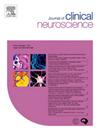新生帕金森病患者肾功能与认知进展的关系
IF 1.8
4区 医学
Q3 CLINICAL NEUROLOGY
引用次数: 0
摘要
与一般人群相比,肾功能下降的慢性肾脏疾病(CKD)患者更容易发生认知能力下降。目的肾功能参数是否能有效预测帕金森病的认知进展尚不清楚。方法本研究从帕金森进展标志物倡议(PPMI)数据库中招募612例帕金森病(PD)新生患者。为了检验肾功能参数与认知之间的关系,我们使用了多元线性回归模型和混合效应模型。采用Cox回归研究肾功能参数是否是PD患者发生痴呆的危险因素。结果回归分析显示,肌酐(Cr)、血尿素氮(BUN)、血尿素氮/肌酐比(BUN/Cr)和肾小球滤过率(eGFR)与整体认知评分有显著相关性(MoCA, β = 0.066, p = 0.015; β = -0.043, p = 0.025; β = -0.070, p < 0.001; β = -0.058, p = 0.013)。血清尿酸(SUA)和血清尿酸/肌酐比值(SUA/Cr)与执行功能/工作记忆的认知能力下降有关(LNS, β = -0.045, p < 0.001; β = -0.032, p = 0.025)。在平均随访7.26±2.50年后,较高的SUA/Cr和eGFR与较高的PD痴呆发生率相关(HR = 1.014, 95% CI 1.004 ~ 1.024, p = 0.006; HR = 1.190, 95% CI 1.023 ~ 1.384, p = 0.025)。结论我们的研究结果揭示了PD患者肾功能与认知的关系,提示肾功能可能在新生帕金森病患者的认知进展中起作用。本文章由计算机程序翻译,如有差异,请以英文原文为准。
Association of renal function with cognitive progression in de novo Parkinson’s disease
Background
People with chronic kidney disease (CKD) who had decreased renal function were more likely to develop cognitive decline in contrast to the general population.
Objective
Whether renal function parameters can effectively predict cognitive progress in Parkinson’s disease is not yet clear.
Methods
In the present study, 612 de novo Parkinson’s Disease (PD) patients from the Parkinson’s Progression Markers Initiative (PPMI) database were recruited. To examine the associations between renal function parameters and cognition we utilized multiple linear regression models and mixed-effects models. Cox regression was used to investigate whether the renal function parameters were the risk factors for developing dementia in PD participants.
Results
Regression analyses indicated that creatinine (Cr), blood urea nitrogen (BUN), Blood urea nitrogen / Creatinine ratio (BUN/Cr), and estimated glomerular filtration rate(eGFR) were strongly associated with cognitive score as indicated by global cognition (MoCA, β = 0.066, p = 0.015; β = -0.043, p = 0.025; β = -0.070, p < 0.001; β = -0.058, p = 0.013, respectively). Serum uric acid (SUA) and the serum uric acid / Creatinine ratio (SUA/Cr) were associated with cognitive decline as indicated by executive function/working memory (LNS, β = -0.045, p < 0.001; β = -0.032, p = 0.025, respectively). Higher SUA/Cr and eGFR were associated with a higher incidence of developing PD dementia after an average follow-up of 7.26 ± 2.50 years (HR = 1.014, 95 % CI 1.004 to 1.024, p = 0.006; HR = 1.190, 95 % CI 1.023 to 1.384, p = 0.025, respectively).
Conclusions
Our findings revealed the relationship between renal function and cognition in PD patients, which indicated that renal function might play a role in cognitive progression in de novo Parkinson’s.
求助全文
通过发布文献求助,成功后即可免费获取论文全文。
去求助
来源期刊

Journal of Clinical Neuroscience
医学-临床神经学
CiteScore
4.50
自引率
0.00%
发文量
402
审稿时长
40 days
期刊介绍:
This International journal, Journal of Clinical Neuroscience, publishes articles on clinical neurosurgery and neurology and the related neurosciences such as neuro-pathology, neuro-radiology, neuro-ophthalmology and neuro-physiology.
The journal has a broad International perspective, and emphasises the advances occurring in Asia, the Pacific Rim region, Europe and North America. The Journal acts as a focus for publication of major clinical and laboratory research, as well as publishing solicited manuscripts on specific subjects from experts, case reports and other information of interest to clinicians working in the clinical neurosciences.
 求助内容:
求助内容: 应助结果提醒方式:
应助结果提醒方式:


